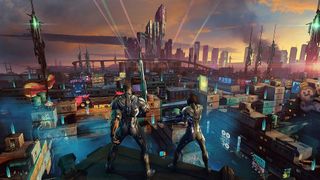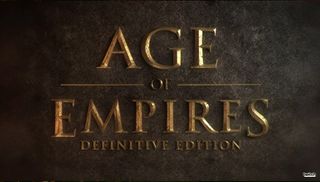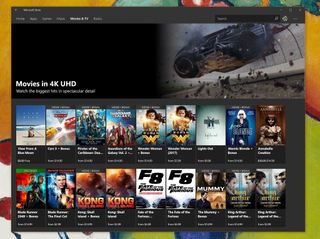This is what the future of Xbox looks like
The future of Xbox, what does it look like?

Microsoft's latest console, the Xbox One X is off to a solid start, beating the PlayStation 4 Pro in its launch week by a significant margin.
After years of struggling behind PlayStation in terms of hardware power, Microsoft's Xbox is now firmly in pole position, delivering a $500 box that not only trounces the PlayStation 4 Pro for 4K video game visuals, but delivers additional features like UHD Blu-ray, HDMI-in, and 4K game DVR. The Xbox One X is simply hard to fault, at least on paper.
A lot of the conversation surrounding Xbox has now turned towards its first-party games line-up, which isn't catering to the maturing "core" audience in the same way Sony appears to be, with photorealistic games like God of War, The Last of Us 2, and Death Stranding on the roadmap. By comparison, Microsoft hasn't committed to announcing titles coming beyond 2018, and the ones that are on the way, namely Crackdown 3, Sea of Thieves, and State of Decay 2, probably won't get the same attention as a gritty, narrative-heavy realistic open world title like PlayStation's God of War or Horizon Zero Dawn might.
Also, there's the issue of services and the uncertain future of Windows to discuss. With Groove Music abruptly shut down, many have rightly wondered if Microsoft still has the will to compete for consumer's attention in other areas. Is Movies & TV on the way out too? What about Cortana on the Xbox with Kinect killed off? And what happened to Xbox One X VR?
Here's everything we think we know about the future of Xbox, pulled from insider knowledge, various Xbox exec interviews, and general gaming trends.

Games, games, more games
This is the part you're most likely interested in. What's the status of games at Microsoft Studios?
With Xbox head Phil Spencer promoted to the senior leadership team, you can firmly expect investment in first-party, line-up defining games to increase, but it will most likely be a few years before we see that investment materialize. Now that Spencer is an Executive Vice President, he can pitch strategy directly to CEO Satya Nadella, without having use Windows Executive Vice President Terry Myerson as a go-between for both strategy and budgeting.
Get the Windows Central Newsletter
All the latest news, reviews, and guides for Windows and Xbox diehards.
One of the reasons we haven't heard more about Microsoft's future roadmap for Xbox exclusives is quite literally cold feet. After high-profile cancellations including Scalebound, and Fable Legends, and notable delays from Crackdown 3 to Sea of Thieves, Microsoft is playing its cards more closely to its chest, waiting for specific development milestones to be locked in before announcing launch dates.

I know from conversations with people working at Xbox that the company is aiming to bring more "core" games to the table, so expect to see some announcements in that sort of vein at 2018's E3 conference.
Spencer said in recent interviews too that Microsoft was looking to either build new studios, or acquire existing ones. There has been a few rumors revolving around PlayerUnknown's Battlegrounds' developer BlueHole Inc. as a potential acquisition target, but nothing has materialized as of writing. If true, that should give you an idea of the type of games Microsoft is interested in building.
"Games as a Service" has been a hot button topic in recent months, due to the creeping influence of free-to-play (or pay-to-win) elements in $60 premium games. In some respects, Microsoft got ahead of the curve with these sorts of mechanics on console, introducing a dedicated mode into Halo 5 dubbed "Warzone," which revolves around wanton carnage using Halo 5's most powerful weapons and vehicles – that you earn (or pay) for the right deploy via card packs.

Microsoft seemed to sidestep criticism for these systems by leaving them in a self-contained game mode. Halo 5's "Arena" PVP system is the pure Halo experience players expect and love, where the only involvement from paid loot packs comes in the form of cosmetic customization. Microsoft repeated the tradition of separating loot packs and a "pure" multiplayer experience in Halo Wars 2 as well, splitting out a separate Blitz mode where players could either earn, or pay their way to stronger units.
The upcoming open-world connected adventure Sea of Thieves is expected to utilize some form of in-game loot crates as well. It's unfortunate that premium gaming has come to this, but considering Microsoft's relatively gentle approach to these systems in previous games, coupled with the massive backlash against more aggressive monetization seen in recent titles like Battlefront II, I think it's fair to expect that Microsoft will continue to be careful about how it approaches "Games as a Service." That's not to say Microsoft will only build service-type games, though.

Microsoft is also working on Age of Empires IV to serve a relatively niche, but passionate, hardcore RTS fanbase. The company also poured funding into other non-live experiences, such as upcoming open world zombie apocalypse simulator State of Decay 2, action RPG Ashen, and the recent side-scrolling breakthrough adventure Cuphead. Xbox has a desire to cater for as many types of audiences as possible with its games, and that's likely to continue.
Cloud and Xbox Live services
The promotion of Spencer to the senior leadership team shows a great deal of faith and support for gaming at Microsoft in general, and it fits right into Microsoft's wider cloud-first strategy. Microsoft has already been able to shift one of 2017's biggest games, PlayerUnknown's Battlegrounds, over to Windows Azure for its live services, ditching Amazon in the process. More companies could follow suit.
Microsoft made a huge deal about "cloud powered" computation at the start of this generation, but it has yet to materialize in any meaningful way, save for the A.I. mobs in Titanfall. Crackdown 3 is supposed to be launching with cloud-powered destruction physics, but the promised multiplayer tests were indefinitely postponed, and we haven't heard much about cloud compute since. I'm not sure whether Microsoft is still pursuing cloud-powered computation for future titles, outside of multiplayer services, but if Crackdown 3 is successful, we could see more investment in this area. For the most part, Microsoft will be using the cloud to increase engagement on Xbox Live.

To this end, Microsoft already has baked new features into Xbox Live — including Mixer streaming, Clubs, Tournaments, and Looking for Group — but the apps that power these services outside of your console are slow as molasses on Android, iOS, and even on quad-core Core i7 Windows 10 PCs.
Microsoft will be looking to improve these systems and services going into 2018, with particular attention paid to Mixer, a fledgling streaming service with the lofty goal of competing with Twitch, which thoroughly dominates the game streaming space. Microsoft hopes that innovations in interactivity will help Mixer along, but in the future, the technology that powers Mixer's extremely low latency between viewer and streamer could end up in other products.
Phil Spencer has previously teased the introduction of a Netflix-like game streaming service for Xbox, allowing gamers to play their games remotely over the internet via video feeds, similarly to PlayStation Now. Microsoft has already been pursuing this kind of futuristic scenario, but found the costs to be prohibitive, and the experience to be sub-par. As global internet speeds increase, coupled with Mixer's low-latency infrastructure and existing interactivity systems, it's not hard to envision how it could evolve to eventually let you stream your own games to yourself, to any device – maybe even competing consoles.

I wouldn't expect an "Xbox Now" service to arrive in the near future, and it won't replace local Xbox hardware even more long term either (Microsoft is already working on the next box). Just know that Microsoft is definitely exploring this concept.
After Groove Music's abrupt closure, will Microsoft's movies and television digital services the next to be killed off?
Speaking of live services, what about Movies & TV? After Groove Music's abrupt closure, you might be wondering whether Microsoft's movies and television digital services might be next to join it in the great digital afterlife. However, we don't believe that this is the case.
Microsoft was able to provide DRM-free versions of purchased music on Groove, but doing the same for purchased films and TV shows would be a logistical and, potentially, legal nightmare. Not to mention for heavy users, like myself, storing hundreds and hundreds of videos would be simply impossible. Similarly, refunding the millions of dollars worth of purchased content to existing users would also be prohibitively costly. And simply put, we've heard from multiple sources that Movies & TV is a profitable venture.
The fact is, with Groove, few people were using the streaming service due to competition from Spotify on mobile platforms, and the simple fact few people use their TV sets to stream music. They do however, use their Xbox to buy and rent media from the store on a profitable basis.

Some of the criticism falling on Xbox's media business right now is the lack of evolution and development. Amazon Video and Netflix both now support 4K on Xbox One, while Movies & TV has a rather pathetic selection, despite Microsoft's big push with the Xbox One X. Additionally, Disney has built up a new consortium, allowing users to buy movies and shows from any store front, and utilize them across any platform, dubbed Movies Anywhere. Microsoft's absence from this service is notable, but we've heard that the company is working to fix this situation. It sounds as though the Xbox team is looking to improve on this aspect of their overall offering, so stay tuned for that too.
VR and other Xbox features
Finally, Microsoft is still working to bring some other features to Xbox. There's a complete overhaul of Avatars on the way, which has been delayed into 2018. The new Avatars will be far more customizable than the current incarnation, allowing people to express their identity far more accurately than the limited options available now. We've also seen some evidence that Avatars could somehow link into Remix3D.com, allowing users to customize their own 3D models using Windows 10 apps like Paint 3D.
The Xbox backward compatibility library is expected to expand too, including both Xbox 360 and original Xbox games into the mix. The next wave of OG Xbox games is expected to arrive early in 2018, and the Xbox 360 program receives new games every few weeks as usual.
One segment of gaming that remains unknown is VR.
Microsoft announced the Xbox One X with heavy references to VR, stating that the specs were chosen specifically to enable high-fidelity VR experiences. Since then, strangely, Microsoft scrubbed all mention of VR from the console's marketing, leaving us with a relatively uncertain idea of when (or indeed, if) it will come to Xbox One.

Microsoft has stated that it would like to make the headsets wireless before bringing it to Xbox, as to not interrupt the flow of living room use, i.e. not having cables draped all over the place. It's a noble effort, but for those wanting VR today, it leaves us without a firm date for when Xbox One X will see VR. We can only hope we'll get some form of update in 2018.
The future looks bright
The biggest takeaway for this year's Xbox effort is the promotion of Phil Spencer to the senior leadership team, and by extension, the entire Xbox team. For the Xbox team to have a direct line to shape and influence the entire Microsoft ecosystem is a huge watershed moment, and should not be taken for granted by any Xbox fan.
More games are coming, more features are coming, and importantly, more Xboxes are coming. It seems unlikely that Microsoft will allow Sony to outpace it in the power argument in the future, putting an emphasis on Xbox customer's desires and needs above everything else.
It's a great time to be an Xbox fan. I firmly believe that the current team running gaming at Microsoft is ready, and crucially, finally fully able to bring about an exciting future for all gamers in this ecosystem.

Jez Corden is a Managing Editor at Windows Central, focusing primarily on all things Xbox and gaming. Jez is known for breaking exclusive news and analysis as relates to the Microsoft ecosystem while being powered by tea. Follow on Twitter @JezCorden and listen to his XB2 Podcast, all about, you guessed it, Xbox!
